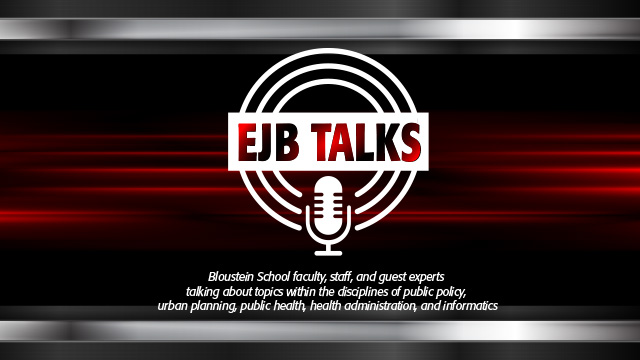We’re kicking off our 4th season of EJBTalks with a discussion about where we stand just two months into a very busy and focused Biden Administration. Professor Stuart Shapiro and Amy Cobb discuss the quick successes like the vaccine rollout and the passing of the critical and comprehensive American Rescue Plan bill. He talks about the importance of the HR1 Voting Rights Act and how the termination of the filibuster in Congress will determine its fate. They discuss the massive and much-needed infrastructure investment bill that the Biden administration is quickly pushing forward. Finally and most excitingly (for him), Stuart gets to touch upon his favorite subject–regulation–and how this administration is made up of talented professionals that understand governance and know the obstacles they face in reversing the attempts by the Trump Administration to deregulate.
Stuart Shapiro
Welcome to EJB Talks. I’m Stuart Shapiro, the Associate Dean of the Faculty at the Bloustein School, and the purpose of this podcast is to talk with my colleagues and our alumni about policy, planning, and health, the interaction between these issues and how they affect people in New Jersey, the United States and the world.
Welcome back from spring break! I hope everyone is enjoying the improving weather. And welcome to season four of EJB Talks. We’re very excited to be in our fourth season. And as we did last season, I think we’re going to start this season with me talking about where we are in politics. And I’m going to invite Amy Cobb over from the other side of the glass from her traditional production role to ask me a few questions about where we stand two months into the Biden Administration. Amy?
Amy Cobb
It’s good to be back on this side for a little bit. It’s exciting. We’re not even…I think we just started our third month of the administration? And we have some positive goals that have already been completed. I was one of those people that didn’t believe in those 100 million doses in 100 days. And, I think that was hit… that goal was hit on day 50. So that’s good news! It’s happy news along with this weather. So maybe for the first little bit, we’ll concentrate on a few of those Biden administration early victories.
Stuart Shapiro
So the Biden administration, I think, very intelligently mapped out what they were going to do when. And they realized, first of all, that attacking the pandemic is priority one because it is the basis on which improving the economy and everything else rests. And so they put a lot of energy into getting vaccines out. And we are seeing fantastic success. We are doing better than almost anyone in the world outside of Israel and possibly the United Kingdom. And the pace of vaccination is accelerating. I got my first shot last week. I’m very excited about that. And it’s quite remarkable. And certainly, I think by early summer, we will have shots in arms for almost anyone who wants one.
Now, another component to the Biden success is, you mentioned the 100 million shots in 100 days. He’s strategically under-promised, right? I think everybody knew that 100 million shots in 100 days was probably a lowball in terms of the guess. But now he can say, look, we’re moving twice as fast…
Amy Cobb
Smart.
Stuart Shapiro
Yeah, exactly. As opposed to a certain ex-president, who always overpromised and never accomplished what he said he was going to. So Biden really, I think, did an excellent job in strategically doing that. And then he focused on the rescue plan in Congress. Because he also realized he had momentum from the election, he had a Senate Majority, albeit a bare one. And he could use reconciliation to get $1.9 trillion into the pockets of the Americans that, by in large, most need it. It really is a remarkable bill that passed, and I think we will be seeing the effects of it for a long time to come. Some of the programs are temporary, and the long-term evaluation of them will depend on whether or not they can be made permanent, particularly the child tax credit. But it really is quite an accomplishment. So I think the Biden administration has succeeded beyond most people’s expectations in these first two months.
Amy Cobb
I had one question that I was curious about. The American Rescue Plan specifically, we all talk about those direct payments, and rental assistance, and basic small business assistance, which are all desperately needed right now. But you brought up the long-term impact. And I was curious if you could give a little bit more history and information on the child tax credits, and what those could possibly mean, going forward.
Stuart Shapiro
So there’s been a lot of talk the past five years about things like a universal basic income. About just getting cash in the pockets of people who need cash. And this bill, more than anything since early in the Great Society, does that. It does it for only a year. The program is a year-long, and then a lot will have to depend on whether or not it can be made permanent. I think if it’s going to be made permanent, probably it’s going to have to adopt some of the ideas that Senator Romney has proposed because it will need to get a little more bipartisan support in order to get through the Senate. But the fact that Romney was out there with his proposal is, I think, encouraging. Right now, it’s a tax credit to anyone with kids. And it lasts for a year. It’s essentially, I don’t even remember the dollar amounts…
Amy Cobb
I want to say $300-$400 if I remember correctly.
Stuart Shapiro
I think that’s right. And that’s a huge difference for a lot of people. And then there’s a lot of details to be worked out; Does everyone get it? Do we phase it out by income? What about families without kids? All these other questions need to be answered by all means. But the fact that we’re doing something like this is an expansion of the power of the purse, unlike any we’ve seen in a long time. I would rate it behind the Affordable Care Act right now in long-term impact, because the Affordable Care Act was obviously permanent, and this is temporary. But if this becomes permanent, it’s the biggest deal since the Great Society.
Amy Cobb
So that’s a positive. We want to focus maybe a little bit on some challenges and opportunities over the next month, I don’t want to be negative.
Stuart Shapiro
One person’s challenges another person’s opportunities.
Amy Cobb
That’s right. So I think one of the big discussions here that doesn’t always make a lot of sense if you’re not really paying attention or haven’t been, because there have been so many other things going on… Is the voting rights. The HR1 and the lasting legacy on both state and federal policies. Can you give a really brief — and I know it’s a really big package coming through Congress — what is HR1? What does it mean? And also how are we filtering these things down with regards to state and federal voting rights acts and issues that we’ve been seeing since, well, the last six months to a year?
Stuart Shapiro
So HR1 is the most important bill that Congress will consider this session and maybe for a long time. The trend over the past decade — and Trump accelerated it but he did not originate it — toward restricting people’s voting rights by using things like voter ID, by cutting back on early voting, by cutting back on automatic registration, is part of a long-term plan by the Republican party to continue to not need to bring new voters into the party. Now, the ironic thing is some of these early, easy voting things help Republicans as well as they help Democrats. But in any case, Republicans have been convinced for a long time that the more people vote, the worse the Republican party’s chances are of succeeding. And I think that has some merit, not as much as some people fear or argue. And in a democracy, voting is fundamental, right? There is nothing more important than voting. It’s why the Voting Rights Act in 1965 was the necessary culmination of the legislative pieces of the civil rights movement. And it is why, after the Civil War amendments, that the South reacted by making it hard for people to vote, despite it being unconstitutional to do so.
And so, voting is fundamental. Voting is number one. Everything else that you want, you want healthcare, you want a clean environment, you want redistribution of income, any of those things you want, you don’t get them without an electorate that represents everyone. And so HR1 is an attempt to arrest this trend of restricting people’s voting rights that the states have pushed forward. There’s a lot in it. Most of it is just making difficult or making illegal some of the things that states have tried to do to restrict voting. There’s also campaign finance stuff in there. I wouldn’t dwell too much on that, because I don’t expect that to hold up in the courts, particularly with the courts as they’re currently constituted. But the pieces of it that eliminate the barriers to voting by themselves are so important that nothing else matters as much in this Congress.
Amy Cobb
So I think something that keeps coming up with regards to the Voting Rights Act — HR1 — I keep hearing about the filibuster. That congressional Democrats want to change or get rid of the filibuster. I know the Biden administration hasn’t taken as strong a stance. I know they’re a little worried about completely saying, let’s rid ourselves of the filibuster. I think the Biden ministration said something about, only the “talking filibuster.” And then, of course, McConnell, and his promise of a “scorched earth” response from congressional Republicans, if something changes with the filibuster? Can you give a little bit of quick background and why this is all coming with regards to HR1?
Stuart Shapiro
HR1 will not get 60 votes in the Senate. It’s that simple. There’s no way you’re going to find 10 Republicans, if you find two I will be pleasantly surprised. So that raises the question of anyone who can do simple math, why do we need 60 votes? There are 100 senators, 50 plus Kamala Harris is a majority. Well, the reason, of course, is the filibuster. For anyone who’s seen Mr. Smith Goes to Washington, you hear the filibuster, and you think of some idealistic person standing up and holding the floor and reading from the phone book, reading from the Bible.
Amy Cobb
Or Leslie Knope, Stu! I think of Leslie Knope.
Stuart Shapiro
Or Leslie Knope, that’s right, in Parks and Rec. Absolutely. And so, that’s your image of the filibuster. Well, several decades ago… well, first of all, during most of its history, the filibuster was not used for heroic purposes. It was used by people like Strom Thurmond to stop civil rights legislation from advancing. So several decades ago, the leaders of both parties came to an agreement, which was that we no longer needed to have people stand up and filibuster, you just would deny… we would just require 60 votes to close debate. And if it didn’t get 60 votes, we would move on. This had a very real advantage. And I don’t want to minimize this. This had a very real advantage in that if you can just move on, then you can get onto other business. You can confirm judges, you can move on to other legislation. You’re not stuck with someone filibustering for days, weeks on end, eating up valuable time on the Senate calendar.
The unintended consequence — and maybe Mitch McConnell saw it from the beginning and it was an intended consequence — is that it became routine to oppose cloture motions. So if you only needed 40 votes to stop cloture, there’s a very low cost to senators to say, “No, we’re going to oppose cloture, we’re going to stop the bill with just 40 votes.” It effectively turned the Senate, which already has a bias towards smaller states, into really a minoritarian institution. If you only need senators representing 20 states — 40 seats — to stop a piece of legislation, then it really makes it hard. Now, you always only needed 40, but there was a political cost to doing so, you have to get up and hold the floor.
The idea of the filibuster will not go away. And Joe Manchin and Kyrsten Sinema — two Democrats — have clearly indicated that they will not support the end of the filibuster altogether. What they may support, and what President Biden came out and said he would also support, is a return to the old days. Return to the days of Strom Thurmond and Mr. Smith. Where if you want to stop a piece of legislation you have to hold the floor. There are trade-offs there, as I said, that will stop businesses. People are going to get upset when Ted Cruz is filibustering for days on end. And that means not as many Biden judges will get confirmed. That’s a very real possible consequence of this. On the other hand, it will put whatever issue Ted Cruz is filibustering on the front page of the newspapers for days on end. And if there is real public support for stopping or for supporting an HR1, for example, then that will start to manifest itself because that issue will get a lot of publicity. You won’t be able to kill it quietly with a cloture vote.
I am somewhat optimistic that we will move there. Whether that gets us HR1 or not, or some version of it, I don’t know. Whether that gets us DC statehood, we haven’t talked about that, also very important. Whether it gets us DC statehood also an important question. Now the other thing is after a couple of weeks of that, of Ted Cruz, of having to watch Ted Cruz, day in day out, ((laughing)) which is enough to change anyone’s mind about almost anything. ((laughing)) The other aspect of it is maybe Joe Manchin says, “Well, I’d be willing to support an exception to the filibuster for voting legislation, not for anything else. But just for voting legislation.” That’s a possible scenario here. It’s going to take steps, it’s going to take time. We’ll see what happens.
Amy Cobb
I’m so glad that you got to bring up Ted Cruz twice in the discussion. ((laughing))
Stuart Shapiro
And we didn’t even talk about him going to Cancun. ((laughing))
Amy Cobb
We didn’t! ((laughing)) Alright, so I’m just taking a turn to something that’s actually a little bit more near and dear to my old working heart. Infrastructure. So the beauty of deferred maintenance, old construction, bridges that need assistance, the dire shape of roads, tunnels, ports. Al that positive stuff, Stu. So one of the many things I keep seeing in the papers… I said papers, wow, that really dated me…((laughing)) online, is the now bold possibility of the Biden administration and their plans to invest. Particularly in these critical infrastructures. And that kind of makes me feel a little bit of a reflection on the WPA and how you get people back to work while fixing or improving or enhancing infrastructure. So that’s a positive. But one of the pieces that I keep seeing is that, will Congress balk at these large projects, because you’re starting to hear these louder whispers about real tax hikes that we haven’t seen since 1993. So we have to weigh these things. So what is your take on these infrastructure projects, these bills, and the whispers of tax hikes?
Stuart Shapiro
So it was a running joke during the Trump administration, that it’s infrastructure week. ((laughing)) They, continually said this week we’re going to turn to infrastructure. And of course, before long, thank goodness the former president, would tweet something out. And all of a sudden, nobody was talking about infrastructure anymore. The Biden administration has made infrastructure a priority. Because infrastructure involves public spending, they could probably use reconciliation on that as well and get it through with only 50 votes, They may be able to get more than 50 votes on infrastructure. Infrastructure is of course, wonderful. We all love infrastructure. But it also is a great vehicle to include pork on bills. To go ahead and buy a senator, a congressperson’s vote, by promising a major expenditure in their district or their state. So it’s perhaps the kind of thing that could have some bipartisan appeal.
But even if it doesn’t, the prospect of using reconciliation is a way that infrastructure can get done. If I was going to think about things in Congress that the Biden administration will accomplish on top of the American Rescue Plan, infrastructure, I think, would be the most likely thing to happen. I’m not optimistic about climate change legislation, about immigration legislation. I think those are much, much harder. But I do think we will have a major infrastructure bill. And in doing so, as you said, that’s also an employment bill. And that’s also a bill that can be used to help people that have been put out of work over the past several years. Particularly the past year. So I do think we’ll probably see something in that direction.
Amy Cobb
You did avoid one small part of that entire question. The whispers about tax hikes.
Stuart Shapiro
Again, whether or not the Democrats want to do that, it’ll be interesting. Because you’ll have a choice of… if you put tax hikes in there, you have to go the reconciliation route. Because you won’t get Republican votes or you won’t get more than one or two at most. If you don’t put tax hikes in there, you might be able to get the 60 votes and claim it’s a bipartisan agreement. They’re gonna have to very carefully take the temperature of Republicans and make a decision… and of Joe Manchin, the most powerful man in America after the president…
Amy Cobb
Yes exactly ((laughing))…
Stuart Shapiro
And make a decision about which of those two routes they want to take.
Amy Cobb
You never know who’s going to become the most powerful when they’re sitting in the Senate. It’s never who you think it’s going to be. Is it?
Stuart Shapiro
Yeah, that’s right.
Amy Cobb
All right. So we’re going to end on, I know your favorite subject… regulation. What has happened in the first few months of Biden’s administration that has been slowed down by the previous administration’s policies? It’s like I don’t want to say his name, like Voldemort.. And what are you looking forward to over the course of the next few months that gives you hope with regards to regulation and regulation in the future?
Stuart Shapiro
So, yeah, regulation is the area I study and actually have made my living on. And rarely talk about on these podcasts because there’s always Trump to talk about, or Voldemort or, He Who Shall Not Be Named. ((laughing)) And so in a sense, and this is again — not just Trump, but he made it much worse — gave people the impression that the President can snap his or her fingers and all of a sudden regulations will change. The result of Trump doing that was that many of his attempts to change regulation didn’t work. They were thrown out by courts because they tried to do them too quickly. They did them in a very sloppy manner. The court said you didn’t do the analysis you needed to do, you didn’t engage the public the way you’re supposed to engage it, go back to go, don’t collect $200.
And so the Biden administration won’t make those mistakes. The Biden administration is largely going to be made up of professionals who did this under the Obama administration, who are very talented lawyers, and people who study the regulatory process. They’ll follow the right steps. The trade-off of that means it’s not going to happen quickly. Now in areas where the Trump administration screwed up, and their deregulatory initiatives were thrown out by courts, then great, the Biden administration gets to start with a clean slate, or maybe even can just put back in place the Obama regulations.
In areas where the Trump administration was either lucky or did do a more competent job, it will take the Biden administration several years to reverse some of the things Trump did. That’s true in immigration, that’s true in climate change. That’s true in any of those areas where we won’t see Congress acting because of the factors we talked about before. And so instead, we’re limited to the options that the executive branch has for dealing with these problems. And so it’s going to take time in many of these things because we want to get it right. We want to follow the law. The hope is that it doesn’t take so much time that the Biden initiatives are at risk if he loses in four years or such. So they have to balance. They have to move quickly so that they can defend their actions in court by 2025. But they can’t move so quickly that those actions are very hard to defend. It’s a very fine line, but they have very talented people working on it.
Amy Cobb
It’s exciting that there are professionals that understand regulation.
Stuart Shapiro
What a concept, professionals that understand governance is a step change that really everyone should appreciate.
Amy Cobb
I definitely do. Stu –it was good to visit you on this side of the glass. This was great, and thanks for having me on.
Stuart Shapiro
Excellent. Well, thank you for doing an outstanding job asking the questions. Thanks to Karyn Olsen as well for her role in production and publicity. We will be back next week with another episode of EJB Talks where I’ll be asking the questions and someone else will be given the answers. Until then, stay safe.




